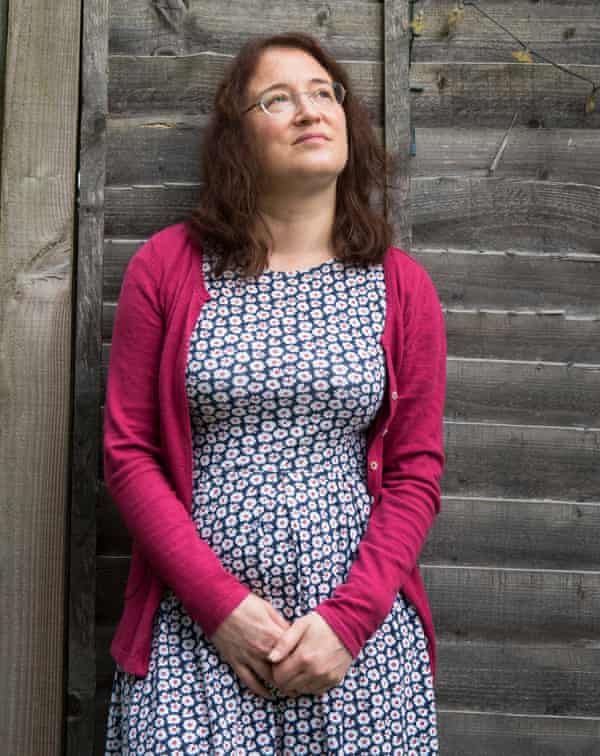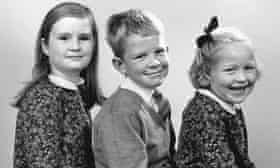My Sis Is Crying Again Because of Your Cousin in Spanihs
W hen my sis died, I lay down on the flooring of my function and howled. My father'due south phone call telling me the news remains the near shocking moment of my life. Colleagues brought me tissues and queued upwardly to tell me they were distressing. I took the tissues, only I couldn't really talk. Later, I met a friend for a drink. Nosotros had a bottle of wine and a bowl of fries.
Nobody tells you what to do when your sibling dies. I was 36. My sister was 41. My sis just collapsed and died. It felt surreal. Information technology still feels surreal. It's 17 years since she died. 2 years afterwards, my male parent died. My mother died just before Christmas terminal twelvemonth. I have a well-practised strategy for grief. Just shove it right out of your head. Information technology was working pretty well until, two weeks ago, I picked up a memoir called Small Pieces by the poet and author Joanne Limburg. By the terminate of it, I was in pieces, a howling wreck on a sofa, feeling that something had been unleashed that I could not put back.

Limburg was 38 when her uncle phoned to tell her that her blood brother, Julian, who was two years younger, had killed himself. "He said: 'I retrieve you'd amend sit down,'" she tells me at her house in Cambridge. "'I've got some terrible news.'" She puts down her mug and sighs. "I'1000 feeling physically sick, maxim it again. When I put the phone downwardly, and phoned my husband, Chris, I was just walking up and down, proverb 'this is ridiculous, this is ridiculous'. It undermined reality, somehow. It makes no sense and never will."
"In that location's before and there's after," writes Limburg in the book, "before and later my brother's suicide", the "betoken of fracture in my world". What he did "sent out cracks in all directions – all the way through the family story, past and hereafter". Before her blood brother's suicide, in that location was her father's decease. After, in that location was her mother's death. If that sounds grim, it tin't be helped. Small Pieces is beautiful, incredibly moving and, at times, extremely funny. When I finished it, I knew I had to meet its author. I don't know all that many people who accept lost iii members of their firsthand family unit. It can feel like a slightly embarrassing pile-up of grief.
There are many moments of embarrassment in Limburg's book. There'south the moment when, having flown beyond the Atlantic to console Julian'due south widow and daughter, they are politely asked to go out. There'south the small talk with the neighbours and friends who are asked to await after them, "a marathon coffee morn with simply the occasional break here and at that place for a bout of hysterical grief". There's the colleague of Julian'southward who uses the wake as an opportunity to avowal about his own writing. Limburg grimaces when I bring this up. "Someone," she says, "in one case tried to do business organisation with my cousin at her mother's funeral. Nobody," she adds, "knows what to practise."
And that's without all the practical stuff: the food, the flowers, the ashes. When I went to pick up the sandwiches for my sister's wake, G&South had lost the order. I had to beg them to find some because I couldn't tell my female parent. "Those things are such a daze, aren't they?" says Limburg. "I talk in the book afterward my mum's death about the difficulty I had getting her torso released then we could have it buried before Jewish new year."
Limburg's Judaism is central to the book, the faith of her forebears and her family. The book has the subtitle A Book of Lamentations, and is punctuated with questions about Jewish theology in a sometimes ironic juxtaposition of the horrors of life and the supposed goodness of God.
Limburg stopped going to synagogue after a traumatic miscarriage, but her Judaism, she says, merely won't go away. "It became clear to me as I was writing, how tangled up my mother and my brother and my customs and my babyhood are with Judaism. I thought, well, I could attempt to extricate it, or I could acknowledge that it runs all the way through. Intellectually, I don't believe in God, but I feel that God is still at that place for me, every bit a kind of metaphor."
Some other parallel, I tell her. I was brought up as a practising Anglican, but ditched church for Camus and Sartre when I was 13. At 14, I went to a youth club, to meet boys. Unfortunately, it was attached to a Baptist church and I became an evangelical Christian. I lost my faith, dramatically, when I was 26, but I'yard notwithstanding moved by the poetry of the Bible and the dazzler of church building music and hymns. "Religion," says Limburg, "gives me this lovely stock of images and metaphors. You lot can use them to express feelings. The fact that they're common cultural holding means that you lot're not alone. That," she adds, "is a huge consolation."
But the main consolation, it'due south clear, is writing. Limburg has published four verse collections, a historical novel and a memoir about her obsessive-compulsive disorder, The Woman Who Thought Too Much. At the beginning of Small Pieces, she quotes some scribbled notes, taken on the plane to her brother's wake, which are, she says, "a clear indication" that she would break the vow she had made not to make "artistic capital" out of her brother'south death. Information technology'due south a vow she just couldn't keep. Writing, she says in a alphabetic character to the rabbi she met merely after Julian's death, "is how I procedure my grief". Information technology started, she explains, with poems she could not end, and then with a PhD. "I was looking," she says, "at grief and complicated grief, and sibling relationship, and trauma." It was only after her mother died that she felt set up free to write it. Because information technology's still only months since my mother died, her descriptions of her mother's concluding days in hospital nearly finished me off.

"At that place are just a few memoirs past bereaved siblings," Limburg says, "and even fewer past siblings bereaved by suicide. Quite often the other person was the difficult one." That was certainly true in my family. Although my sister did not kill herself, she did have schizophrenia and a troubled life. "Merely," says Limburg, "I was the fuck-upwardly. Ultimately, I got a diagnosis of Asperger's and I was aware that my brother had grown up with this sibling that wasn't quite correct. I had guilt considering I felt my blood brother was a more useful person than me, and as if our family unit was a balloon debate, and I was the i who should have jumped."
I gasp. I want to cry. Only Limburg gives a wry smile. She is, she says, learning to live with her guilt. And sense of humor, information technology's clear from the volume, is one of the things that has got her through. "In that location's a phrase," she says, "'the situation is hopeless, only non serious'. That'due south how I see life, and all these things that are just dreadful. If you don't laugh at them, yous would gyre upward in a heap and wail."
Yes, y'all would, and sometimes y'all do. Mostly, I don't. Since my mother died, I oasis't looked at photos or read any of her messages. The time will come to do these things, but I can't exercise them now. I even so find it a struggle with my sister and my father, and that was a long fourth dimension ago. At least with a parent, the death is in the right gild. "Yes," says Limburg, "it's in the correct order. But my brother and I will never be reconciled to it, because it absolutely shouldn't have happened."
I think that'south realistic. I think that's right. People talk nearly "closure", every bit if death is a court instance that tin exist dismissed. And so what is the best you can aim at? Limburg takes a sip of her coffee and sighs. "Living with," she says. "I see it every bit: you shoulder your burden and you carry on."
In the United kingdom, the Samaritans can be contacted on 116 123. In the Us, the National Suicide Prevention Lifeline is i-800-273-8255. In Commonwealth of australia, the crisis back up service Lifeline is on xiii eleven 14. Other international suicide helplines can be institute at befrienders.org .
Source: https://www.theguardian.com/lifeandstyle/2017/sep/23/sister-loss-sibling-grief-bereavement-joanne-limburg-brother-death-memoir
0 Response to "My Sis Is Crying Again Because of Your Cousin in Spanihs"
Postar um comentário